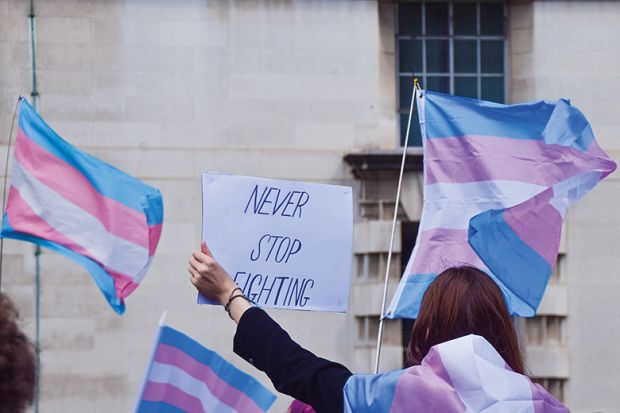Two academics whose film was blocked from being shown at the University of Edinburgh because it was accused of being “transphobic” have vowed to continue trying to screen it because the “implications of shutting down debate are enormous”.
A screening of Deirdre O’Neill and Michael Wayne’s Adult Human Female had already been cancelled in Nottingham after two separate venues refused to show it, when a scheduled showing was halted by students blocking entry into a lecture hall in Edinburgh.
LGBTQ+ groups and the local branch of the University and College Union called the film a “clear attack on trans people’s identities” and said it violated Edinburgh’s “respect” policy.
But Dr O’Neill, senior lecturer in film, theory and practice at the University of Hertfordshire, said the accusation the film was transphobic was “absurd”.
“The film points out that trans people should be treated with the same respect and dignity as everyone else…The people who are accusing us of being transphobic, hate-filled, bigots – they obviously haven’t watched the film,” she told Times Higher Education.
Professor Wayne, who lectures in media and film at Brunel University London, said they were aware their project could prompt a backlash but wanted to explore the conflict between the rights of transgender people and women because it was an area that “should be held up to scrutiny and should be a matter of debate”.
“I think you can tell the film has been made by academics in the tone and approach we took. It is a shame it has been received so poorly by some fellow academics – not in the spirit with which it has been made, but in the spirt of denunciation,” he said.
Edinburgh, which called off the screening because of “safety concerns”, reiterated its commitment to academic freedom and said it expected the right to protest to be exercised lawfully and peacefully. But Professor Wayne said the university appeared to have been poorly prepared for the protests.
“If students can stop this going ahead just by blocking a room, and stopping access, it is not real – the claim to defend academic freedom,” he said. “You have to make it real by ensuring, yes, protesters can protest but they do not have the right to stop people assembling, watching a film and discussing it.”
The organisers of the screening, Academics for Academic Freedom, have promised to try to reorganise the event, and Dr O’Neill said they now saw more public screenings as necessary to reaffirm their “right to come together and discuss the issues in the film”.
A premiere at London’s Conway Hall did take place in November but a cinema due to host a screening in Nottingham cancelled the event and a Methodist church also pulled the plug at the last minute when protesters amassed outside.
“Incredibly, we are going to have to organise events under the radar and keep it quite quiet because everything we do is going to be obstructed and there will be attempts to shut it down again,” Dr O’Neill said.
Professor Wayne said universities had a role to play in creating a space where people could watch the film, but this would require a “re-education” of staff and students in the “importance of debating ideas”.
“The implications for the university sector and democratic society as a whole are enormous,” Dr O’Neill added. “If we can say there are certain areas that are not up for debate, what is the next thing?”
Register to continue
Why register?
- Registration is free and only takes a moment
- Once registered, you can read 3 articles a month
- Sign up for our newsletter
Subscribe
Or subscribe for unlimited access to:
- Unlimited access to news, views, insights & reviews
- Digital editions
- Digital access to THE’s university and college rankings analysis
Already registered or a current subscriber? Login








